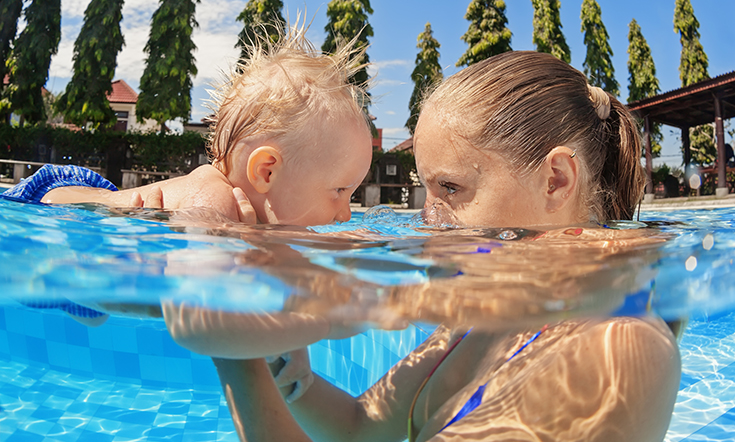

Taking a baby swimming may make parents wonder how safe it is for their baby. With enough preparation and a first-time to try, it can prove to be fun and a bonding moment for both the parent and the baby.
Your baby will enjoy the new sensations he experiences in the water and get an early start on learning important water skills. However, many parents are nervous about the dangers that they may encounter in the pool so please read on as later in this article you will have an idea on what you need to know about baby swimming.
Baby swimming
Babies under the age of 6 months have a natural reflex that enables them to naturally hold their breath under the water. They also have amazing swimming strike actions and can propel themselves through the water.
At four months, the baby is able to hold his head up and more aware of what is happening around him. It is a good time to take him into the water.
How old does a baby need to be to take swimming?
For most parents, the family bath is probably the best and most convenient place to start developing the affinity that many newborns have with water. This can begin once the baby is home and the umbilical cord has healed. Often newborns are bathed in a sink or counter top tub. The bathtub is another option and should be used at every opportunity. Fill it up with warm water, get in with your child and let them enjoy the full benefit.
The recommendation of the Australian Swimming Coaches and Teachers Association is that infants can start a formal program of swim lessons at 4 months of age.
The best time of the day and preparations
Choose a time of the day when your baby is usually awake and arrange a convenient time for yourself and your spouse if you plan to go together. If no other preferences, go swimming with your baby in the afternoon or early evening. It is a best time for most babies because after swimming, your baby will be exhausted afterwards that he will sleep for a long period, and if you got lucky, even for the night.
What should my baby wear at the pool?
Parents who swim a lot can get a pack of swim nappies that can be located in the nappy sections of most supermarkets. Most resorts require that babies wear swim nappies while in the pool.
Swimming pools may have individual disposable swim nappies available for purchase at their store. Swim nappies are meant to contain poop, and are not waterproof. Besides the swim nappy, baby can wear a swim suit in the pool if the parent wants.
Swimming with your baby
When your baby is wet, he may become slippery in your hands, so make sure that you hold your baby securely while in the pool. You can also use different floatation devices to make your baby more secure in the pool. Many pools have this and you can easily request for it but you should always remember that a floater is not a safety floatation device as it can flip over any time.
Swimming safety and precautions
- Always keep an eye on your baby to prevent your baby from drowning.
- Keep your hands on your baby at all times and protect him from the sun. Try to apply waterproof sunscreen if going to an outdoor pool.
- Consider the temperature, it should be about 32 degrees and beware of hypothermia – too cold.
- Avoid water intoxication – swallowing too much water.
- Communicable diseases – including skin infections, pink eye, and most commonly, diarrhea, which your baby can get from swallowing contaminated pool water.
- The chlorine in the water can really make both you and your baby’s skin very dry. To prevent this, bring a moisturising lotion with you to put on after baby’s finished and toweled dry.
There are babies that love organised swimming but for some, they hate it. If your baby doesn’t like swimming after a few attempts, give it up and reintroduce at a later date.






















